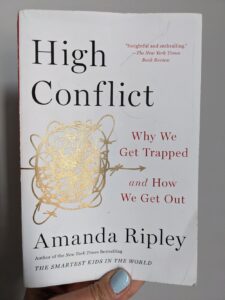High Conflict by Amanda Ripley
Written by Ashley Kelmore, Posted in Uncategorized
Best for:
Anyone interested in narratives around people making connections across seemingly large divides.
In a nutshell:
Journalist Ripley explores the concept of ‘high conflict’ through the stories of a few different individuals and groups.
Worth quoting:
“The challenge of our time is to mobilize great masses of people to make change without dehumanizing one another.”
“Hatred assumes the enemy is immutable. If the enemy will always be evil, there is no reason to ever consider any creative solutions to the conflict.”
Why I chose it:
Way back in autumn of last year, when I bought this book, I was trying to figure out better ways to deal with interpersonal conflict.
Review:
It took me a long while to get into this book. I started it back in December 2023, but only over the last couple of weeks have I really gotten into it, probably reading about 2/3 of it in that time. That doesn’t mean it’s a bad book, but I had to meet it where it is, because I don’t think it’s quite what I was looking for. I thought it would be a bit more prescriptive about managing and working through conflict. And while there are tips, and a couple of appendices, it’s more like a series of long-form essays exploring different types of conflicts. And looking at it that way, it’s a decent book, though I do disagree with some point, or at least some of the characterizations the author makes.
Ripley talks about Gary, who lives in a tiny, well-off community in the San Francisco Bay Area, and how his attempts to make change in the volunteer board governing the town deepened conflict within. She interviews Curtis, a former gang member who has managed to leave that life. She talks to Sandra, a former member of FARC in Colombia who decided to reintegrate into society. And she looks at a synagogue in New York that participated in an exchange with corrections officer in Michigan in an attempt to learn more about each other.
The chapters that looked at Curtis’s life I found to be quite interesting, because they look at what it takes for someone to make individual changes, and the support that is needed. Both Curtis and Sandra were involved in serious conflicts – gang wars, and paramilitary battles. And both on some level had to make the individual choice to leave, but they were only able to stay out because of family, community, and financial (possibly governmental) support.
The section with Gary was mostly interesting because Gary found himself deeply mired in conflict but was himself a conflict mediator by trade. Irony! But also a good example of how one can be absolutely knowledgeable about how to help others, but not take their own advice, because they convince themselves that they are right.
I think the struggle I have with this book is that I still am not quite sure how to apply this when the stakes are super high AND many people are involved AND there are potentially ‘right’ answers. And it’s interesting to read this book that was published a few years ago, because the conflict in Israel and Palestine features. Obviously the past seven months have brought this into stark view for many more people that before, and it can be deeply challenging to have conversations about this when the stakes are so high. From my perspective, I just have such a hard time wrapping my head around anyone who doesn’t see what Israel is doing to the Palestinian people as deeply immoral. And there are people who feel even more strongly about that than I do, as evidenced by encampments at universities and direct action against weapons manufacturers. But where is the solution if people are not willing to have the conversations that Ripley recommends? Like, it seems odd for people to have to plead their humanity? And I am sure there are people who feel basically completely opposite to me who cannot wrap their head around my perspective. But neither of us are decisions makers – and they aren’t talking to each other.
I can see it working for lower stakes issues, like choosing a provider for a contractor, or even things that have a wider impact, like tax rates. But for the really ‘high conflict’ issues, if the decision makers, or the people who can make the changes, are not willing to have conversations with people who have different views, what options are left?
Basically, even though Ripley uses some very large geopolitical examples in the book, I see her arguments making much more sense and being more effecting at the micro level. And generally speaking, that probably will work for me in most instances. But at the macro level? How can it work if folks won’t try it?
What’s next for this book:
I’ll probably hold onto it as it has some appendices that might prove useful in the future.

